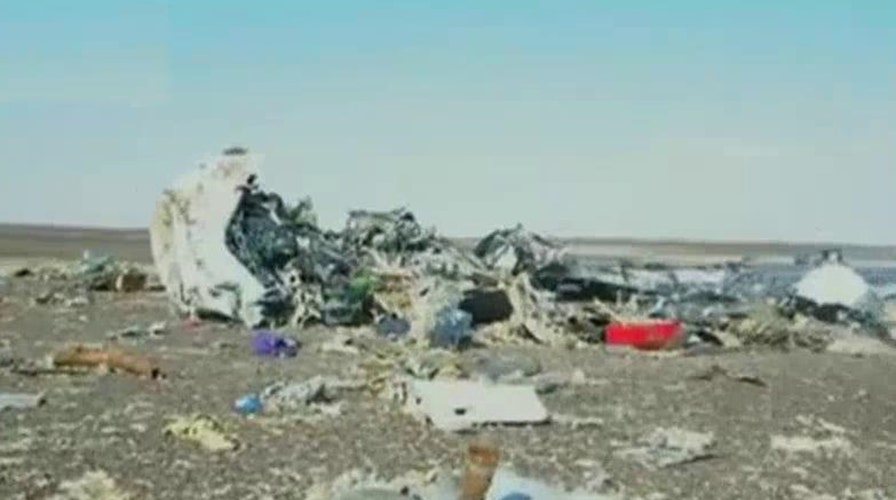The Russian passenger plane that crashed in Egypt, killing everyone onboard, broke up at high altitude, Russia's top aviation official said Sunday.
The Metrojet plane, bound for St. Petersburg in Russia, crashed 23 minutes after it took off from Egypt's Red Sea resort of Sharm el-Sheikh on Saturday morning. The 224 people on board, all Russian except for four Ukrainians and one Belarusian, died.
Fragments of the plane were found scattered over a large area, indicating it disintegrated high in the air, said Alexander Neradko, head of Russia's federal aviation agency. Neradko, along with two Russian Cabinet ministers, were in Egypt inspecting the crash site in a remote part of the northern Sinai Peninsula, where Egypt is fighting an Islamic insurgency.
However, Neradko wouldn't comment on a possible reason for the crash, saying the probe was ongoing.
The news of a high-altitude breakup comes on the heels of reports that the co-pilot of the doomed jet had doubts about the plane’s safety before the flight.
Natalya Trukhacheva, the wife of co-pilot Sergei Trukhachev, said late Saturday that her husband had complained about the plane's condition, according to an interview with state-controlled NTV.
Trukhacheva said her daughter "called him up before he flew out. He complained before the flight that the technical condition of the aircraft left much to be desired."
An Egyptian ground official told The Associated Press Sunday the plane was in good shape before it took off. The official said he was a member of a technical inspection team that included two Russians.
"We are all shocked. It was a good plane. Everything checked out in 35 minutes," the official told The Associated Press. The closest the plane came to being in trouble, he said, was three months ago when the pilot aborted takeoff halfway through because of a system error.
More information about the crash will be known once the information from the plane’s black boxes is deciphered. The Telegraph reported Sunday that the black boxes were recovered and they have been sent for analysis.
Ayman al-Muqadem, an Egyptian official with the government's Aviation Incidents Committee, said Saturday air controllers lost contact with the plane’s pilot after he radioed that the aircraft was experiencing technical problems and that he needed to make an emergency landing.
The jet then dropped off radar screens.
A ministry statement said Egyptian military search and rescue teams found the wreckage of the passenger jet in the remote mountainous Hassana area 44 miles south of el-Arish, an area in northern Sinai where Egyptian security forces are fighting a burgeoning Islamic militant insurgency led by a local affiliate of the Islamic extremist group ISIS.
The Egyptian officials said the aircraft was cruising at 36,000 feet when contact with the jet was lost. Flight-tracking service FlightRadar24 said the plane was losing altitude at about 6,000 feet per minute before the signal was lost, Reuters reported.
Adel Mahgoub, chairman of the state company that runs Egypt's civilian airports, said except for three Ukrainian passengers all on board were Russian citizens.
Sky News reports about 150 bodies have been recovered so far, many of whom were still strapped to their seats. Russian officials said 25 of those on board Flight KFL-9268 were children.
Russian President Vladimir Putin declared Sunday as a national day of mourning, and the Kremlin sent an emergency response team to help out at the crash site.
Sky News reported Saturday that a branch of ISIS claimed responsibility for downing the plane in a statement.
“The soldiers of the caliphate succeeded in bringing down a Russian plane,” the Islamic State affiliate said, according to The Telegraph. It also reportedly said downing of the plane was a revenge attack for Russian airstrikes against ISIS in Syria.
However, those claims had been vehemently denied.
Three military experts told The Telegraph that ISIS doesn’t have surface-to-air missiles capable of hitting a plane at such a high altitude. However, they didn’t dismiss the possibility of a bomb on the plane or the possibility of a surface-to-air missile strike if the plane had been trying to make an emergency landing as it descended in altitude.
Russian Transport Minister Maxim Sokolov scoffed at the ISIS claim, telling the Interfax news agency that such reports “must not be considered reliable.”
As a precaution, French airline Air France and German air carrier Lufthansa said they would avoid flying over the Sinai Peninsula for safety reasons.
A spokeswoman for Lufthansa told The Associated Press that the company had decided in a meeting Saturday that the carrier would not fly over Sinai as long as the cause for the crash “has not been clarified.”
Dubai-based Emirates airline also announced Sunday its decision to stop flying over Sinai until more information is released about the crash.
The Associated Press contributed to this report.

